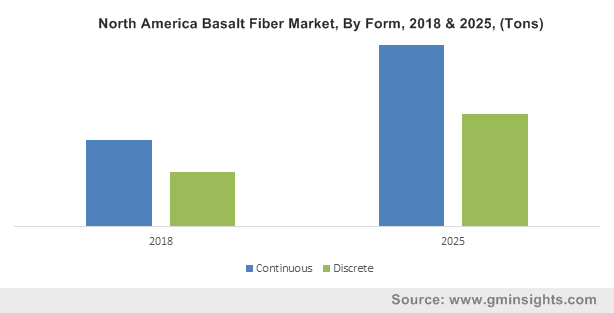Basalt fiber market to be driven by growing demand from aerospace, and automotive sectors
Publisher : Fractovia | Published Date : 2019-08-02Request Sample
Driven by the rising environmental concerns, basalt fiber market is gaining huge traction from increasing use across numerous applications including construction, automotive, aerospace, defense, electronics, and more. For the uninitiated, basalt fiber is a material created from fine fibers of basalt, comprising of the minerals pyroxene, plagioclase, and olivine. It has a similar chemical composition as fiberglass while consisting better physiomechanical properties and is cheaper compared to carbon fiber.
North America Basalt Fiber Market, By Form, 2018 & 2025, (Tons)

The use of basalt fibers in concrete is a major driver for global basalt fiber market size. Concrete strengthened with fiber is extensively used for enhancing tensile and flexural strength of concrete. The surge in construction and infrastructure activities, across the world, will primarily drive the use of basalt fibers in concrete.
The demand for housing, infrastructure, commercial space, and retail are burgeoning across several developed and developing nations, primarily owing to urbanization and steady rise in population. This will present a lucrative opportunity for basalt fiber manufacturers over the coming years, thereby augmenting global industry share.
Apart from this, the demand for products such as construction textiles and basalt fiber reinforced polymer bars are likely to witness immense demand since the material is an effective substitute for steel bars in the construction industry. Corrosion problems are a serious issue in building construction and basalt fiber bars could tackle the problem better as opposed to steel. Moreover, basalt fiber bars cost less and have better durability under extreme weather conditions. These factors could further escalate material demand in the construction business space and contribute to basalt fiber market share over the coming years.
The power sector is another key application arena driving basalt fiber market trends, fueled by the growing concerns regarding high carbon levels. The fiber’s optimal features like high energy absorption and low peak load are likely to result in low power consumption, thereby promoting energy efficiency. The demand for electronic devices is expected to increase in the succeeding years, due to rising population and increasing disposable income, which will boost material demand in the power sector over the forecast period.
Rapid growth across the automotive sector will also present significant opportunities for basalt fiber manufacturers across the world. Although the passenger vehicle segment is facing a setback, other segments of the automotive industry are experiencing considerable growth. For example, the sale of Ford’s range of big trucks including F-650 and F-750 models surged 83% over the first half of the year.
The heavy vehicle industry is growing at a great pace majorly driven by the increasing integration of electric vehicle technology. Based on the recent advancements in polymer science, the demand for basalt fiber in interior automotive applications like brake pads or headliners have surged, which would substantially contribute toward basalt fiber market outlook.
Aerospace and defense is anticipated to be the fastest-growing end-use segment in the global market. Being produced from basalt filaments the notable properties of basalt fibers in aerospace are its thermal stability and heat insulation. Since basalt is a product of the volcanic activity, its outstanding thermal properties make it an extremely useful material for aerospace projects. For example, products like basalt fiber plates can offer structural reinforcement to jets and other aircraft. Moreover, basalt fiber composites are emerging as highly useful material in building low-weight and high-resistance drones, which will further boost material demand in the aerospace sector.
Based on regional analysis, the North America market is anticipated to lead the global basalt fiber industry over the ensuing years. Factors like steady population growth, increasing construction and infrastructure activities, coupled with the presence of a well-established automotive sector will drive growth in the region. Owing to the availability of jobs coupled with open immigration policies, Canada’s witnessing an outburst in commercial construction, compared to the United States, both of which are significant drivers for the North America basalt fiber market share.
According to a research report compiled by Global Market Insights, Inc., basalt fiber market is anticipated to be worth more than $400 million by 2025.